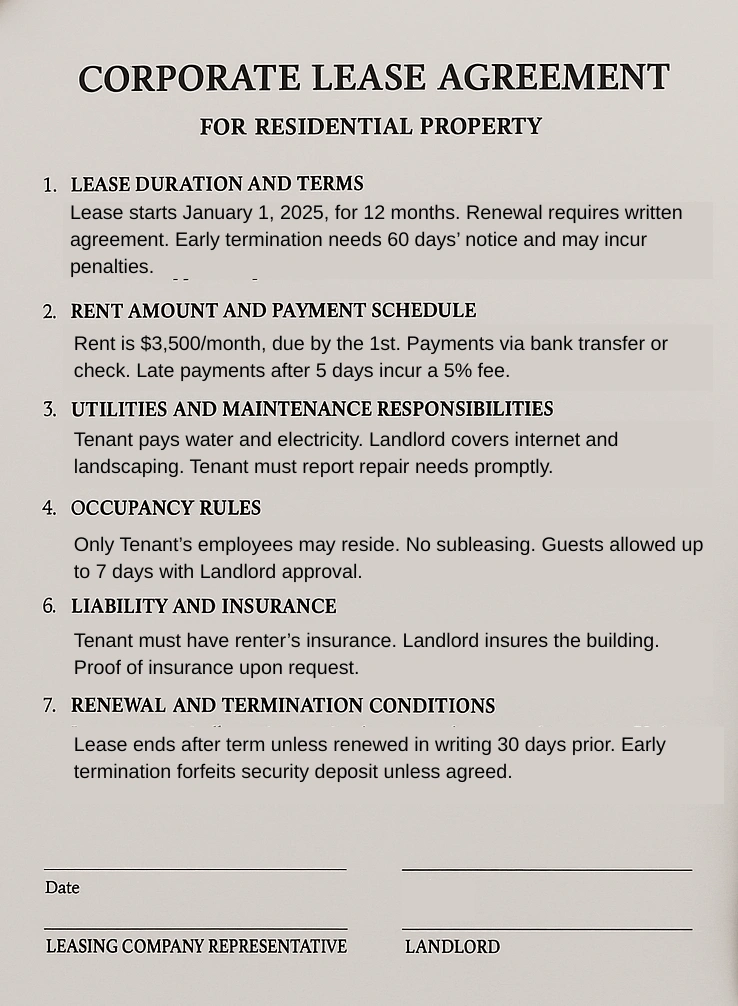A corporate lease for residential property is an agreement where a company, rather than an individual, rents a home or apartment for its employees or business needs. This type of lease is commonly used to house relocated staff, temporary workers, or executives, offering flexibility and convenience for both the employer and the employee.
Key Takeaways
- Corporate leases allow businesses to rent residential properties for employees, offering flexibility and convenience.
- Unlike personal leases, corporate leases are signed by companies who assume full responsibility for the property.
- Landlords benefit from corporate leases through reliable payments, longer terms, and professional tenants.
- Various types of corporate leases exist, including short-term, long-term, furnished, and executive options.
- Working with specialized providers like Chicago Suburbs Stay simplifies the corporate leasing process and ensures quality housing solutions.
What Is a Corporate Lease
A corporate lease is a rental agreement in which a business entity, rather than an individual, signs the lease and assumes responsibility for the property. These leases are typically used to provide housing for employees, such as executives, relocated staff, consultants, or contractors, who need temporary or long-term accommodations.
In a corporate lease, the company is the official tenant, meaning it handles the rent payments, utilities, and other lease obligations, even though the property may be occupied by one or more of its employees. Corporate leases are commonly used for furnished apartments, condos, or single-family homes in desirable or convenient locations near business hubs. T
his arrangement offers flexibility for employers needing to support mobile or project-based teams and can be an attractive option for landlords as well, since corporations often offer reliable, on-time payments and longer-term lease commitments. However, corporate leases also come with specific considerations, including liability, lease terms, and tax implications, which we’ll cover throughout this post.
Corporate Lease vs Personal Lease
The main difference between a corporate lease and a personal lease lies in who signs the lease and assumes legal responsibility for the rental property. In a corporate lease, a business or organization is the official tenant, meaning the company signs the lease, pays the rent, and is liable for any damages or lease violations. The property is typically used to house employees for work-related purposes, such as relocations or temporary assignments.
In contrast, a personal lease is signed by an individual who lives in the property and is personally responsible for meeting all lease terms, including rent payments and maintenance obligations. The individual’s credit and rental history are evaluated during the application process, whereas with a corporate lease, the company’s financials and reputation are typically reviewed.
Another distinction is flexibility. Corporate leases often come with more negotiation power and may include added services like furnishings or cleaning, while personal leases are usually more standardized. Ultimately, corporate leases serve business needs, while personal leases are focused on individual housing requirements.
What Is a Corporate Lease for Residential Property
A corporate lease for residential property is a rental agreement in which a business, rather than an individual, leases a home, apartment, or condo to provide housing for its employees. In this setup, the company is the official tenant, responsible for paying rent, utilities, and meeting lease terms, even though the property is occupied by an employee or contractor.
These leases are often used for relocating staff, short-term assignments, or long-term executive stays. Corporate leases offer flexibility for businesses and can be attractive to landlords due to stable, on-time payments and potential long-term agreements.
What Does a Corporate Lease for Residential Property Include
A corporate lease for residential property typically includes several important components that clearly define the terms and responsibilities for both the leasing company and the landlord. These elements ensure smooth management of the property and protect the interests of all parties involved. Key inclusions in a corporate lease are:
- Lease Duration and Terms – Specifies whether the lease is short-term or long-term and outlines the start and end dates.
- Rent Amount and Payment Schedule – Details the monthly rent, payment due dates, and acceptable payment methods.
- Utilities and Maintenance Responsibilities – Clarifies which party is responsible for utilities like water, electricity, and internet, as well as property maintenance and repairs.
- Furnishing and Amenities – Indicates whether the property is furnished or unfurnished and lists any included appliances or services such as cleaning or landscaping.
- Occupancy Rules – Defines who is allowed to live in the property and any restrictions on guests or subleasing.
- Liability and Insurance – Outlines liability coverage requirements and whether renter’s insurance is necessary.
- Renewal and Termination Conditions – Explains how the lease can be renewed, terminated early, or extended, including notice periods and penalties if applicable.
These points together create a comprehensive framework tailored to meet the needs of corporate tenants while providing landlords with clear expectations.

Benefits of Corporate Lease for Landlords
A corporate lease can offer several advantages for landlords, especially those looking for stable, long-term tenants and low-maintenance arrangements. When renting to a company rather than an individual, landlords often benefit from consistent income and a more professional leasing experience. Key benefits include:
- Reliable Payments – Companies typically have strong financial backing, ensuring timely rent payments.
- Longer Lease Terms – Businesses often seek extended leases to support employee relocations or long-term assignments, reducing vacancy risk.
- Lower Turnover – Even if the individual occupant changes, the lease remains with the company, minimizing disruption.
- Professional Tenants – Corporate occupants are usually employees on assignment, who tend to maintain the property well.
- Streamlined Communication – Landlords deal directly with the company’s housing or HR department, making issue resolution faster and more efficient.
- Potential for Furnished Rentals – Corporate leases often involve furnished units, allowing landlords to charge higher rents.
These benefits make corporate leasing an appealing option for property owners seeking steady income and a more predictable rental experience.
Types of Corporate Leases
Corporate leases can take several forms depending on the company’s needs, the duration of stay, and the level of services required. Understanding the different types of corporate leases can help landlords and businesses choose the right arrangement for their situation. Common types of corporate leases include:
- Short-Term Corporate Lease – Typically lasting a few weeks to a few months, this lease is ideal for temporary assignments, business travel, or training programs.
- Long-Term Corporate Lease – These leases span several months to years and are often used for relocated employees or executives requiring stable housing.
- Furnished Corporate Lease – The property comes fully furnished, including furniture, appliances, and sometimes utilities, catering to companies looking for turnkey housing solutions.
- Unfurnished Corporate Lease – The business leases a standard, unfurnished property and furnishes it based on employee needs.
- Executive Lease – A premium, high-end lease arrangement designed specifically for senior-level executives, often including luxury amenities and services.
- Serviced Apartment Lease – Similar to a hotel but rented on a longer-term basis, these leases include cleaning, maintenance, and sometimes concierge services.
Each lease type offers different levels of flexibility, cost, and convenience, allowing companies to tailor housing solutions based on employee roles, budgets, and duration of stay.
Secure Your Corporate Lease with Chicago Suburbs Stay
Chicago Suburbs Stay is a locally owned provider specializing in short- and mid-term corporate housing solutions in Lake Zurich, Illinois. Catering to professionals, families, and medical staff, they offer both furnished and unfurnished rental options designed for comfort and convenience.
Why Choose Chicago Suburbs Stay?
- Personalized Service: As a family-run business, they provide direct communication and tailored support, ensuring a seamless experience from inquiry to move-in.
- Prime Location: Situated in Lake Zurich, their properties offer proximity to top-rated schools, corporate hubs, and the Barrington Metra train station, facilitating easy access to downtown Chicago.
- Flexible Housing Solutions: Whether you’re transitioning between homes, on a corporate assignment, or in need of insurance housing, they accommodate various housing needs with flexible lease terms.
- Comfortable Living Spaces: Their homes are located in family-friendly neighborhoods, providing a safe and peaceful environment with access to parks and recreational activities.
For more information or to explore available properties, visit Chicago Suburbs Stay or contact us.
Conclusion
Corporate leases for residential properties provide a practical and flexible housing solution tailored specifically for businesses and their employees. Corporate leases allow companies to lease homes, apartments, or condos, they simplify relocation, temporary assignments, and long-term stays while offering landlords stable income and professional tenants.
Whether opting for short-term or long-term arrangements, furnished or unfurnished units, corporate leases meet diverse business needs with added convenience and reliability.
Partnering with trusted providers like Chicago Suburbs Stay can further streamline the process, offering personalized service and well-located, comfortable housing options in the Chicago suburbs. For businesses looking to support their workforce efficiently and landlords seeking dependable tenants, corporate leasing presents a win-win opportunity worth exploring.
FAQs
Who is responsible for maintenance and repairs in a corporate lease?
Typically, the lease agreement specifies whether the landlord or the corporate tenant handles maintenance and repairs. Most often, landlords take care of major repairs, while tenants manage minor upkeep, but terms can vary.
Can employees living in a corporate leased property personalize or modify the space?
Modifications usually require landlord approval. Corporate leases often restrict significant changes to maintain the property’s condition, but small, temporary personalizations might be allowed.
Are utilities included in corporate leases?
It depends on the lease terms. Some corporate leases include utilities like water, electricity, and internet, especially in furnished or serviced apartments, while others require tenants to pay separately.
Is renter’s insurance necessary for corporate leases?
While often optional, many landlords or companies require renter’s insurance to protect against liability and personal property loss during the lease term.
Can a corporate lease be transferred to another employee?
Yes, since the company is the tenant, they can assign or allow different employees to occupy the leased property without signing a new lease, depending on the agreement.
Are corporate leases more expensive than personal leases?
Corporate leases can sometimes be higher in cost due to furnished accommodations, included services, and shorter lease terms, but they offer convenience and reduced hassle.
What happens if the employee occupying the property leaves before the lease ends?
The company remains responsible for lease obligations and rent payments unless otherwise negotiated with the landlord. The company can find a replacement occupant or sublease with permission.
How does a landlord verify a corporate tenant’s credibility?
Landlords usually review the company’s financial statements, creditworthiness, and business history to ensure reliable rent payments and lease compliance.

